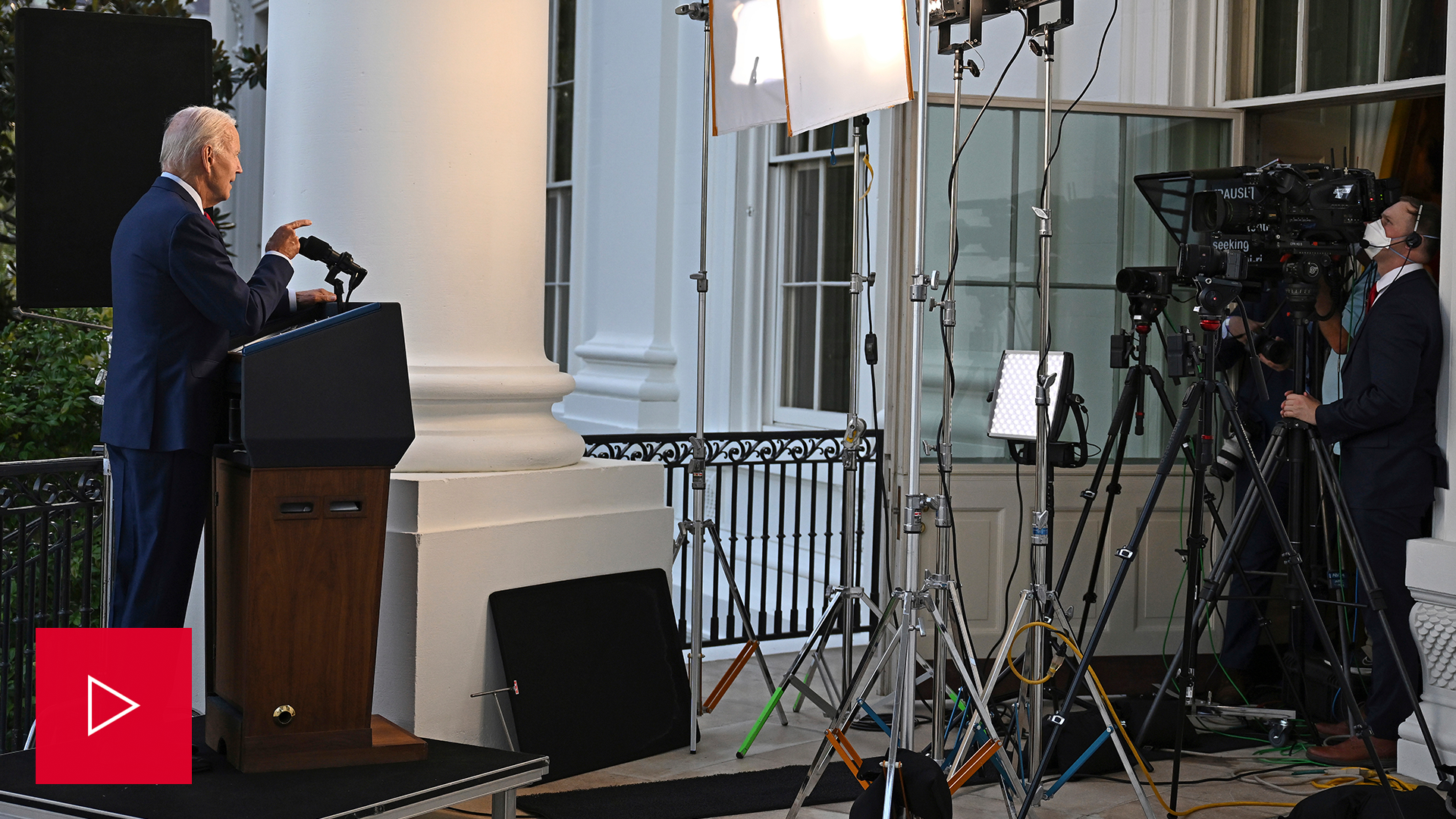| | |  | BY NATALIE ALLISON | With help from Myah Ward
| 
Donald Trump embraces Republican Senate candidate Blake Masters at a rally in support of Arizona GOP candidates. | Mario Tama/Getty Images | GAME ON — In a matter of hours, the Senate map for 2022 will nearly be set. Tonight’s primaries in Arizona, Missouri and Washington will answer some of the final remaining questions about the Senate matchups this fall that will determine which party takes control of the upper chamber. By the end of the night, we’ll learn how powerful Donald Trump’s influence continues to be and if Washington State liberal Patty Murray is more vulnerable than we might think. In Arizona, voters are deciding which Republican will take on Sen. Mark Kelly in November, a race that will be one the year’s most competitive and a top battleground in the fight for a narrowly controlled Senate. A Blake Masters victory tonight, as public polls over the last month have predicted, would add another victory to Trump’s mostly successful Senate endorsement record this year. It would also mean that Arizona Republicans are confident in putting up a less conventional candidate than say, Jim Lamon, the wealthy solar power executive and Jeff Roe client who has put at least $14 million of his own money into the race, but lost his lead weeks ago. Masters, 35, is a child of the early internet — he was active on LiveJournal and CrossFit chatrooms , and created dorm room videos rapping in war paint to own the libs at Stanford. Masters’ online footprint — his musings on World War II and how America should have stayed out; his posts about how al Qaeda didn’t present a real threat to Americans — and his close relationship to billionaire tech entrepreneur Peter Thiel give Democrats ammunition to portray him as an out-of-touch millennial tech bro from Silicon Valley. Those details still may not distract Arizona voters from the soaring gas, grocery and housing costs they’ve experienced under Democrats’ trifecta in D.C. In Missouri, today’s GOP Senate contest will determine whether one of Republican insiders’ greatest worries for the cycle is realized: the nomination of former Gov. Eric Greitens. Top Republican leaders and operatives have warned for the past year that nominating Greitens, who resigned mid-term in 2018 amid allegations of sexual assault as well as campaign-finance improprieties, could cost the party an otherwise safe Senate seat — or more likely, force them to spend money defending Greitens against an onslaught of Democratic attacks. Despite Trump’s unexpected dual endorsement of “ERIC” Monday night, which the former president intended to apply to both Greitens and state attorney general Eric Schmitt (the two of which Trump couldn’t decide between) — Greitens’ prospects of winning the primary have looked bleak in recent weeks . A Republican-funded anti-Greitens super PAC has spent more than $6 million on television ads attacking Greitens in the past month, particularly on domestic violence allegations raised earlier this year by his ex-wife. Schmitt, meanwhile, has experienced a surge, according to numerous public polls. Rep. Vicky Hartzler is another top contender in the race.
| 
| And in Washington, today’s all-party primary will give observers some insight into just how vulnerable Democratic Sen. Patty Murray is this fall. While the primary ballot will include a list of candidates from both parties who filed to run for Senate (with the top two vote-getters advancing to the general election), just Murray and Republican Tiffany Smiley have been on television and running well-funded campaigns. If Murray’s support is under 50 percent tonight — which is not out of the realm of possibility — the GOP will have even more of a reason to declare that Washington is in play . National Republicans have suggested for months they were considering putting money into the blue-state Senate race as President Joe Biden’s approval remains underwater. In a state Biden won in 2020 by nearly 20 points, just 43 percent of voters in mid-July approved of his performance, compared to 53 percent who disapproved. Wednesday morning, the NRSC will launch its first ad there attacking Murray. And if conditions remain favorable for them in the coming months, Washington state could become an unlikely battleground this fall. Polls close at 8 p.m. ET in Missouri, meaning results there will likely start trickling in soon after. But pour yourself some coffee, East Coasters, if you intend to see how the races shake out in Arizona and Washington, where vote totals won’t start posting until 11 p.m. ET, at the earliest. Arizona results may be finalized late tonight, but Washington typically takes a day or two. Other major items on the ballot today : Gubernatorial primaries in Arizona and Michigan, and a ballot measure in Kansas to determine whether the right to an abortion should remain in the state constitution. And in the coming weeks, the final big pieces of the Senate map will fall into place after primaries in Wisconsin and New Hampshire, not to mention an all-party ranked-choice primary in Alaska. Follow along tonight with reporters from our politics team, where we’ll keep the updates (and occasional hot take) coming in a live chat that starts at 8 p.m. ET. You can also watch the results come in on POLITICO’s pages for Arizona , Kansas , Michigan , Missouri and Washington state . Welcome to POLITICO Nightly. Reach out with news, tips and ideas at nightly@politico.com . Or contact tonight’s author at nallison@politico.com or on Twitter at @natalie_allison .
| |
| | STEP INSIDE THE WEST WING: What's really happening in West Wing offices? Find out who's up, who's down, and who really has the president’s ear in our West Wing Playbook newsletter, the insider's guide to the Biden White House and Cabinet. For buzzy nuggets and details that you won't find anywhere else, subscribe today . | | | | | | | | 
| BLUSTER, NO BRAWL — House speaker Nancy Pelosi’s arrival in Taiwan today — making her the highest-ranking U.S. official to visit in more than two decades — drew swift condemnation from China, with Beijing sending warships to surround the territory. Twenty-one Chinese aircraft also entered Taiwan’s air defense zone today. To make sense of why Pelosi’s trip has stirred up so much tension, and how bad the aftermath could be, Nightly’s Myah Ward turned to POLITICO’s China correspondent, Phelim Kine for answers. Why does Pelosi, generally someone who lines up behind Biden, think this visit is important enough to defy the administration? There are two reasons why Pelosi has appeared to override expressions of concern about her Taipei trip apparently expressed by both Biden and the Pentagon. The first is that support for democracy and human rights in China — and by definition the struggle of the Taiwanese people to fend off Chinese authoritarian aggression — has been an important thread throughout her career. Pelosi originally planned to visit Taiwan back in April, but that got delayed after she got Covid, and it’s clear that she didn’t want to risk any more delays in making a trip that she sees as potent symbolism of U.S. government support for a key U.S. ally that has become a model of rights-respecting democracy in the Asian region where multiple other countries — think Myanmar and the Philippines — have become synonymous with democratic backsliding and/or human rights abuses. The second reason is that once news of Pelosi’s planned Taiwan trip became public, the Chinese government launched a furious campaign to dissuade her from coming, deploying really over-the-top, threatening rhetoric such as, “those who play with fire will perish by it.” That reaction painted Pelosi — and frankly the entire administration — into a corner politically because if she canceled or even delayed her trip it would be red meat for the GOP who would accuse her — and by extension, Biden — of caving to the Chinese and harming Taiwan’s trust in U.S. government commitments to the self-governing island. That is a position absolutely untenable for Pelosi, not least because of her decades-long history of facing down Chinese authoritarian abuses. What are the potential benefits of her trip to Taiwan? For Pelosi, this trip to Taiwan — which has captured the international news cycle for the better part of a week — is a high-profile capstone to a career of promoting democracy and human rights in China and calling out the ruling Chinese Communist Party’s authoritarian abuses. And it creates an irresistible media narrative of a plucky elderly U.S. lawmaker who defied Beijing’s saber rattling to make an in-person visit to a U.S. ally increasingly isolated and besieged by a Chinese government that has made so-called “reunification” with Taiwan (even though the PRC has never governed the island) a matter of “historical inevitability” at any cost — including a potentially devastating military invasion. For Taiwan, Pelosi’s trip gives the island’s struggle to resist Beijing’s intimidation a global high-profile media platform that highlights the island as a place where respect for democracy and human rights are balanced by a world-class high tech industry focused on the production of semiconductors that are key to our modern global economy. And you can bet that Taiwan’s President Tsai Ing-wen and her government are hoping that Pelosi’s visit will motivate other high-ranking government officials from the U.S, the E.U., Japan, South Korea and other key allies to do likewise. Why is China so mad about this visit, and how bad could this get once Pelosi departs? It’s important to note that Congressional delegations have been visiting Taiwan for decades — including one with then-House Speaker Newt Gingrich in the nineties — with minimal fuss or bother from the Chinese. Typically these trips produce a measure of manufactured rage and invective from Beijing, angry denunciation of alleged violations of the Three Communiques that govern the U.S.-China relationship with Taiwan. But nothing as drawn out and rancorous as what we’re witnessing with the Pelosi trip. And it reflects how Beijing is seeking to move the goal posts of “acceptable” U.S. engagement with Taiwan. This is tied to the fact that since 2013 Chinese President Xi Jinping has made the so-called “peaceful reunification” with Taiwan a key part of his leadership credibility as we approach the CCP’s historic 20th Party Congress in the autumn at which Xi is expected to receive an unprecedented third term as China’s paramount leader. And it’s also personal. The CCP leadership makes no secret of their disdain for Pelosi given her history of advocating for human rights and democracy in China. So this trip for the Chinese leadership is a multi-hot button rage source. In terms of how bad this gets — China has signaled that it will hold significant multi-day live-fire training exercises around the island following Pelosi’s departure, it has imposed import blocks on some 100 Taiwanese agricultural and industrial products and implicitly warned that they are just getting started. But given the fact that Xi doesn’t want to pick a fight with Taiwan — and by extension the U.S. — as he wrestled with an economic tailspin, deep public antipathy toward his Zero Covid strategy and the need to keep things calm and predictable in the run-up to the 20th Party Congress, I don’t expect Beijing to pull anything on either Taiwan or the U.S. that could introduce a problematic new variable into that already complicated mixture of domestic political challenges. Beijing wants to bluster but it can’t afford a brawl.
| |
| | INTRODUCING POWER SWITCH: The energy landscape is profoundly transforming. Power Switch is a daily newsletter that unlocks the most important stories driving the energy sector and the political forces shaping critical decisions about your energy future, from production to storage, distribution to consumption. Don’t miss out on Power Switch, your guide to the politics of energy transformation in America and around the world. SUBSCRIBE TODAY . | | | | | | | — Schumer says senators have reached agreement on veterans health care bill: At his weekly press conference, Majority Leader Chuck Schumer said leadership had reached agreement to vote on three amendments at a 60-vote threshold and then pass the legislation, which boosts health care benefits for veterans exposed to toxic substances such as Agent Orange and burn pits. He confirmed shortly after that he had the necessary buy-in from senators to quickly vote on the measure on the floor. The bill is currently on the floor of the Senate, where it is expected to pass. — U.S. sues Idaho over abortion law: The Justice Department’s lawsuit argues that Idaho’s restrictive abortion law conflicts with a federal law requiring doctors to provide pregnant women medically necessary treatment that could include abortion. The federal government brought the lawsuit seeking to invalidate the state’s “criminal prohibition on providing abortions as applied to women suffering medical emergencies,” Attorney General Merrick Garland said. The announcement is the first major action by the Justice Department challenging a state trigger law since the Supreme Court overturned Roe v. Wade in June. — Judge rejects bid to delay Oath Keepers Jan. 6 trial: The first trial on seditious conspiracy charges related to the Jan. 6, 2021, attack on the Capitol is on track to begin in Washington next month for nine members of the Oath Keepers’ militia, after a federal judge turned down a request today by nearly all defendants to put off the courtroom showdown until next year. | | | |
An additional $313 billion The amount of money about 150 companies would owe over the next decade because of Sen. Joe Manchin and Democrats’ so-called book income tax, a proposal never taken seriously by much of Washington’s tax world, writes Brian Faler . It’s designed to go after companies that report big profits to Wall Street but appear to pay little or nothing to the IRS. Firms making $1 billion would be required to pay at least 15 percent on the profits they report to investors. |
| | | | 
| BIDEN BOUNCEBACK — Standing on the White House balcony on Monday evening, Biden announced that a Hellfire missile drone strike in Kabul killed Ayman al-Zawahri, the leader of al Qaeda who was at Osama bin Laden’s right hand when the terror group struck on Sept. 11, 2001. It was the most successful counterterrorism mission ever carried out in Afghanistan, ordered by a president who ignored bipartisan criticism last year to insist it was time for the United States to end its mission in the war-torn nation, writes Jonathan Lemire . For the administration, the weekend drone strike bolstered its case that its over-the-horizon strategy — meaning that terror threats could be snuffed out in Afghanistan without a significant military presence there — was working. Aides argued that it validated Biden’s decision against asking another American family to sacrifice a loved one in the distant, mountainous land. The operation was among the most significant counterterrorism successes since Navy SEAL Team Six stormed bin Laden’s Pakistan compound in 2011. It comes at a moment when Biden appears poised to arrest and perhaps reverse his slumping political fortunes. Last year’s foreign policy failure hung heavy over the White House. It was twinned with a rise in the pandemic’s Delta variant, sending Covid deaths soaring, and knocked the West Wing off its stride. In the months that followed, the loss side of the ledger grew crowded, with the failures of the president’s Build Back Better initiative and voting rights legislation; the Supreme Court overturning Roe v. Wade; the rise of the Omicron variant, surging inflation and more. Biden’s poll numbers went into a freefall and several Democrats began openly questioning whether he should seek reelection. But in recent weeks, signs of a turnaround emerged: gas prices have begun to fall, gun safety legislation passed, infrastructure investments have begun, Ukraine has held off Russia. And perhaps most potent politically, a sweeping Democrats-only reconciliation package is on the precipice of passing, giving the party an important midterm win and potentially reframing voters’ view of the Biden White House. As Julian Zelizer, presidential historian at Princeton University, put it: “these are types of victories that could strongly undergird a possible 2024 campaign.” Did someone forward this email to you? Sign up here . | |
|
| | Follow us on Twitter | | | FOLLOW US | | |
| |

No comments:
Post a Comment
Note: Only a member of this blog may post a comment.